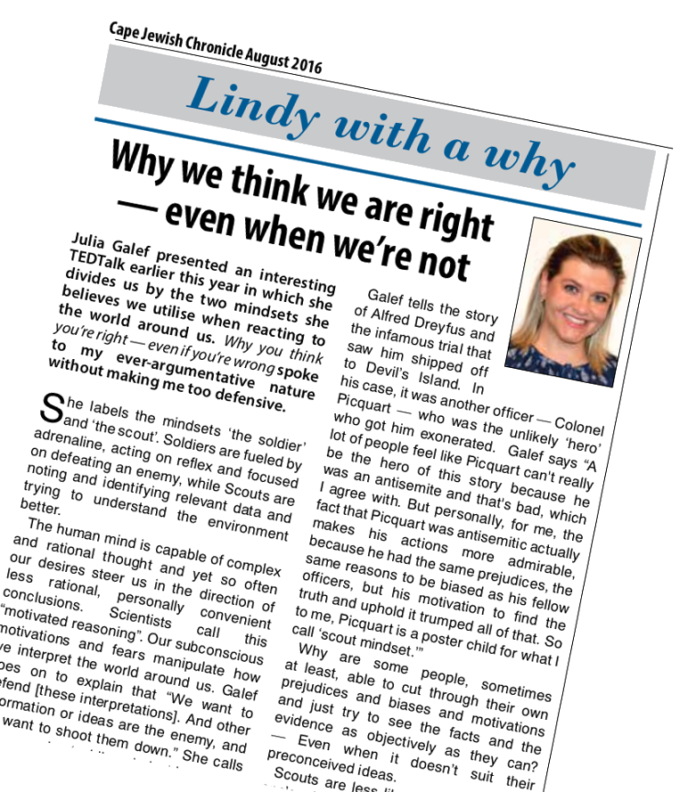Julia Galef presented an interesting TEDTalk earlier this year in which she divides us by the two mindsets she believes we utilise when reacting to the world around us. Why you think you’re right — even if you’re wrong spoke to my ever-argumentative nature without making me too defensive.
The labels the mindsets ‘the soldier’ and ‘the scout’. Soldiers are fueled by adrenaline, acting on reflex and focused on defeating an enemy, while Scouts are noting and identifying relevant data and trying to understand the environment better.
The human mind is capable of complex and rational thought and yet so often our desires steer us in the direction of less rational, personally convenient conclusions. Scientists call this “motivated reasoning”. Our subconscious motivations and fears manipulate how we interpret the world around us. Galef goes on to explain that “We want to defend [these interpretations]. And other information or ideas are the enemy, and we want to shoot them down.” She calls this reasoning ‘soldier mindset.’
We see this thinking in sport. If the referee makes a call that penalises the team we support, we are often quick to criticise the decision. If the referee makes a call that penalises the opposing team — even if we suspect it to be an unfair decision — we are more likely to accept it as a good call.
Or perhaps we read a study with results we do not agree with. It is likely that we would find reasons why that study is not well designed. But if we agreed with the results we would accept the study as a good one. This is where Google searches can fail us. The biased phrases we type into Google to check if something is true will tend to bring up the cases in which that bias is agreed with.
Our judgement is not as balanced and fair as we like to think. It is heavily weighted to the side we want to win. This universal truth shapes how we react to all information that comes to us.
It affects who we choose to surround ourselves with, our political leanings our ideas of fairness and ethics.
Galef tells the story of Alfred Dreyfus and the infamous trial that saw him shipped off to Devil’s Island. In his case, it was another officer — Colonel Picquart — who was the unlikely ‘hero’ who got him exonerated. Galef says “A lot of people feel like Picquart can’t really be the hero of this story because he was an antisemite and that’s bad, which I agree with. But personally, for me, the fact that Picquart was antisemitic actually makes his actions more admirable, because he had the same prejudices, the same reasons to be biased as his fellow officers, but his motivation to find the truth and uphold it trumped all of that. So to me, Picquart is a poster child for what I call ‘scout mindset.’”
Why are some people, sometimes at least, able to cut through their own prejudices and biases and motivations and just try to see the facts and the evidence as objectively as they can? – Even when it doesn’t suit their preconceived ideas.
Scouts are less likely to see changing one’s mind as a sign of weakness. They do not see being wrong as a value judgment. And yet I know for myself it is just so much easier to be a soldier.
Most of my arguments come from a place of frustration and anger and let’s face it, that’s the time we feel the least charitable to understanding another person’s point of view.
The great thing is that being or becoming a scout — which is an accurate predictor of good judgement, by the way — does not rely on how much you know, but rather on how you feel. We need to change the way we look at being wrong or having our accepted ideas challenged.
We need to learn to feel more curious than defensive when our beliefs are contradicted.
I think that if in this lifetime I can just focus on developing my soldier into more of a scout I will have my work cut out for me.
So Galef’s question I want to put to you is this: Do you yearn to defend your own beliefs?
Or do you yearn to see the world as clearly as you possibly can?











